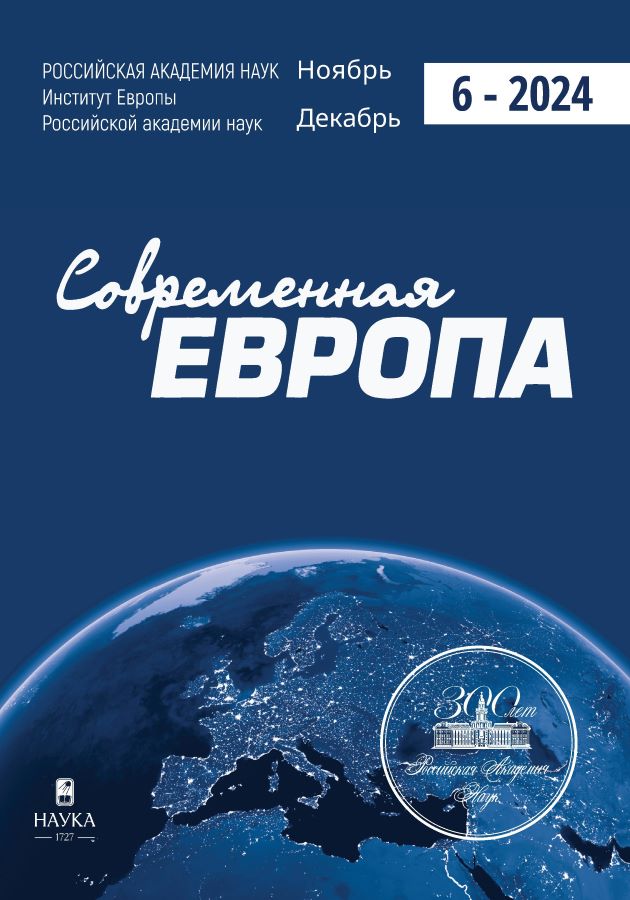German-Turkish Commodities Trade in Contrast to the Decline in German Foreign Trade
- Authors: Gracheva M.V1
-
Affiliations:
- Primakov National Research Institute of World Economy and International Relations, Russian Academy of Sciences
- Issue: No 6 (127) (2024)
- Pages: 124-136
- Section: PROBLEMS OF ECONOMY
- URL: https://ter-arkhiv.ru/0201-7083/article/view/652302
- DOI: https://doi.org/10.31857/S0201708324060111
- ID: 652302
Cite item
Abstract
The article examines the specifics of Germany's trade with Turkey in comparison with the characteristics of all-German foreign trade. The author shows the successful development of the Turkish direction of German foreign trade after 2010, the roles of Turkey and Germany as trading partners, and examines in detail the structure of bilateral trade. Structural changes are analysed on the basis of the electronic database of German Federal Statistical Office, which allows to use the statistics in three profiles – four product groups, thirty branches and 248 product items. Particular attention is paid to the changes that occurred in 2023. The unit costs of exports and imports by product groups are calculated and a significant difference in favor of Germany is revealed for the main product group – finished products. The main branches of export and import are identified and compared with analogous branches of all-German trade flows. Based on this comparison, the peculiar features of the Turkish export market (increased role of the automotive, mechanical engineering and chemical industries, the growing importance of the production of vehicles other than cars) and the import source (increased focus on the automotive, clothing and engineering industries) are formulated. Both the most important and the most promising individual commodity items in bilateral trade are identified (the first include aircraft for export and outerwear for import, the second include auto components and cars for import). The conclusions about the likely increase in the importance of imports from Turkey and the imminent entry of this country into the top ten trading partners of Germany are substantiated.
About the authors
M. V Gracheva
Primakov National Research Institute of World Economy and International Relations, Russian Academy of Sciences
Email: mgracheva@mail.ru
Candidate of Sciences (Economics) Leading Researcher, Department of Economic Theory Moscow, Russia
References
- Аватков В.А., Сбитнева А.И. (2023) Турция - Запад: образцовый антагонизм? Современная Европа. № 5. С. 31-43.
- Аватков В.А., Якимова Д.А. (2020) Отношения Германии и Турции на фоне миграционного кризиса. Современная Европа. № 3. С. 51-60.
- Айвазян Д.С. (2020) Пределы возможностей Турции как транзитного газового коридора. Современная Европа. № 7. С. 79-88.
- Аюпова Н.И., Корнилов А.А. (2017) Динамика экономического сотрудничества Турции с Германией в период правления партии справедливости и развития. Вестник Нижегородского университета им. Н.И. Лобачевского. № 4. С. 16-24.
- Гришин Я.Я., Исламов Д.Р. (2023) Внешняя политика Турции в Европе: фактор «мягкой силы». Современная Европа. № 6. С. 96-109.
- Крапивина В.В. (2022) Результаты и перспективы развития миграционной сделки 2016 г. между ЕС и Турцией. Научно-аналитический вестник ИЕ РАН. № 3. С. 21-32.
- Меньшов А.В. (2024) Турецкий газовый хаб: возможности для Европы и Турции. Современная Европа. № 1. С. 206-215.
- Шумилин А.И. (2020) Евросоюз-Турция: конфликтное партнерство. Научно-аналитический вестник ИЕ РАН. № 5. С. 7-15.
- Шумилин А.И. (2023а) Эрдоган остается: перспективы отношений Турции с США, ЕС и Россией. Часть 1. Научно-аналитический вестник ИЕ РАН. № 3. С. 7-16.
- Шумилин А.И. (2023b) Эрдоган остается: перспективы отношений Турции с США, ЕС и Россией. Часть 2. № 4. Научно-аналитический вестник ИЕ РАН. С. 78-89.
- Экен Э. (2022) Может ли Турция стать газовым хабом? Мировая экономика и международные отношения. № 9. С. 55-63.
- Astrov V, Scheckenhofer L., Semelet C., Teti F. (2024) Monitoring the Impact of Sanctions on the Russian Economy. EconPol Policy Report. No. 47. 20 p.
- Aydin Y. (2023) Ankaras Wirtschaftspolitik in der Zwickmühle. Wie die EU ökonomisch und sicherheitspolitisch mit der Türkei kooperieren kann. SWP-Aktuell. No. 48. 8 p.
- Aydin Y. (2024) Ankara’s Economic Policy Dilemma. Europe’s Options for Economic and Security Cooperation with Turkey. SWP Comment. No. 2. 7 p.
- Aydin Y., Bastian J. (2023) Dynamiken der deutsch-türkischen Wirtschaftskooperation. SWP-Aktuell. No 64. 8 p.
- Matthes J. (2018) Währungskrise in der Türkei. Ursachen und Gefahren. IW-Report. No 31. 26 p.
- Tastan K. (2022) The Challenge of Decarbonisation and EU-Turkey Trade Relations. A long-term perspective. SWP Comment. No. 66. 6 p.
- Tolksdorf H. (2016) Türkische Volkswirtschaft am Scheideweg. ifo Schnelldienst. No 21. P. 7-10.
- Treier V. (2018) Asienkrise 2.0 - droht ein neuer Flächenbrand? ifo Schnelldienst. No 23. P. 6-8.
- Yalçin E. (2023) 100 Jahre Türkische Republik. Neustart oder Kollaps? Wirtschaftsdienst. No 103. P. 361.
- Yürekli A. (2016) Die schwierige Beziehung der EU zur Türkei: Höchste Zeit zu handeln. ifo Schnelldienst. No 21. P. 10-14.
Supplementary files










